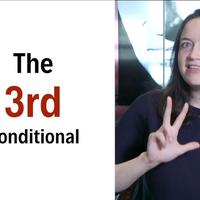The 3rd conditional: What is it? How to use it! - English In A Minute - YouTube
||condicional||||||||||||
|rd|||||||||||||
Das 3. Konditional: Was ist das? Wie man es benutzt! - Englisch in einer Minute - YouTube
El 3er condicional: ¿Qué es? Cómo utilizarlo - Inglés en un minuto - YouTube
Le troisième conditionnel : Qu'est-ce que c'est ? Comment l'utiliser ! - L'anglais en une minute - YouTube
Il 3° condizionale: Che cos'è? Come usarlo! - Inglese in un minuto - YouTube
第3の条件:それは何ですか?どう使うの?- English In A Minute - YouTube
세 번째 조건: 그게 뭔가요? 사용 방법! - 1분 만에 배우는 영어 - YouTube
De 3e voorwaarde: Wat is het? Hoe te gebruiken! - Engels in een minuut - YouTube
Trzeci warunek: Co to jest? Jak go używać! - Angielski w minutę - YouTube
A terceira condicional: O que é? Como usá-lo! - Inglês num minuto - YouTube
Третье условное: Что это такое? Как его использовать! - Английский за минуту - YouTube
3. koşul: Bu nedir? Nasıl kullanılır! - Bir Dakikada İngilizce - YouTube
3-й умовний: Що це? Як його використовувати! - Англійська за хвилину - YouTube
第三个条件:它是什么?如何使用它! - 一分钟英语 - YouTube
第三個條件:它是什麼?如何使用它! - 一分鐘英語 - YouTube
Welcome to BBC Learning English.
||BBC||
I'm Sam and today we're talking about
|Sam|||||
the third conditional.
|tercera|
The third conditional is a little strange
|第三条件文|||||
|tercera|||||
because we're talking about something that
|estamos||||
потому что мы говорим о чем-то, что
didn't happen in the past.
no|sucedió|||
Why would we do that?
perché||||
|verbo auxiliar|||
Почему мы должны это делать?
Well, because sometimes we want to imagine
||a veces||||imaginar
a different outcome.
||resultado
||risultato
||resultado diferente
другой результат.
A friend of mine came to visit me yesterday.
||||è venuto||||
||||||visitar||ayer
It was a surprise, so when I opened my front door, I said:
fue|||||||abrí||puerta|puerta||dije
"If I'd known you were coming,
Se|sapevo||||
|||||venías
I would have baked a cake!"
|||horneado||pastel
Did I know she was coming? No.
Did I bake a cake? No.
||cuocere|||
So I'm imagining a different result.
||immaginando||diverso|
||imaginando|||
Because we're talking about an imaginary past,
we use:
If + the subject + the past perfect,
the subject + would have + past participle
And you can also swap those round:
||||intercambiar||redondeadas
||||trocar||
E você também pode trocar por esses:
What would you have done
|habrías|||
if you'd known your friend was coming?
|habrías|||||venía

